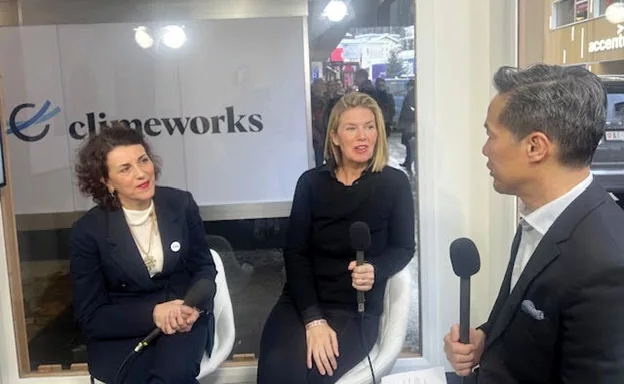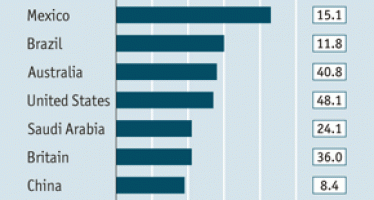The Women’s Brain Project Takes the World Economic Forum 2024 Stage
The Women’s Brain Project (WBP) announces the creation of its new Foundation to support the world’s first Research Institute for Sex and Gender Precision Medicine.
It takes a global stage to discuss a major global research endeavour, and at the recent World Economic Forum 2024, in Davos, Switzerland, the Women’s Brain Project (WBP) did just that: WBP announced the creation of its new Foundation to support the world’s first Research Institute for Sex and Gender Precision Medicine.

Dr Antonella Santuccione Chadha (left) at the World Economic Forum 2024
The new Institute will engage experts from various specialties to collaborate on innovation and research. Its objective is to incorporate considerations of sex and gender in the advancement of precision medicine. Additionally, WBP has initiated a fundraising campaign to support the establishment of the Research Institute, with further details available here.
WEF 2024 was the perfect venue to make this announcement, considering numerous conversations held over the five-day event concerned women’s health. Dr Antonella Santuccione Chadha, co-founder and CEO of WBP, participated in a number of these critical conversations.
The Davos Alzheimer’s Collaborative (DAC), along with WBP, hosted an important discussion on Alzheimer’s disease. The attendees, including Dr Santuccione Chadha, discussed creation of a global Brain Health Ambassadors network to promote inclusion of brain health at the primary care level and the prevention of Alzheimer’s and related dementias.
“Today, we better understand what enables brain resilience and what can prevent Alzheimer’s,” said George Vradenburg, founding chair of the Collaborative. “Using that knowledge to foster brain health across the lifespan is pivotal to stopping Alzheimer’s.
Dr Santuccione Chadha said evidence shows that differences between men and women with regard to Alzheimer’s disease–how the disease presents; the speed, or lack thereof, as to when men and women are diagnosed; and efficacy of treatments–differ significantly.
As women are better communicators, the disease is picked up easier in men than women. “The scales are different,” she said.
Men, she said, might present with more aggression, whereas women appear more depressed. Women are generally diagnosed almost a year later than men, because they are told by their physicians that they are depressed and/or stressed, are subscribed antidepressants, and advised to return many months later.
The latest treatments for Alzheimer’s work better in men than women, she said. “We need to understand why because it is biology. In the end, it is about the right drug for the right patient at the right time,” because such specific treatments will save money.
Arguments about the difficulty in studying women, including female animals in the preclinical setting, are moot, she said. What about the hormonal cycles of males? It is as complex as the women’s.”
DAC also announced the formation of a global network of brain health ambassadors from various specialties who will work with healthcare providers at the primary care level to identify patients at risk or in the early stages of Alzheimer’s disease and other dementias. One in three people globally has a brain disorder. In May 2023, in a Lancet Neurology editorial announcing the WBP-commissioned Economist Impact White Paper, it was highlighted that in the US and Europe alone, the annual cost of neurological disorders amounts to USD $1.7 trillion.
At another event, “Redesigning healthcare with women in mind”; hosted by Kearney, the Life Sciences consultancy, WBP and Kearney signed an open letter aimed to address the world’s female health gap. So far, the letter has garnered nearly 60 signatures. Another discussion in which Dr Santuccione Chadha was titled “A roadmap to sustainable health and better wellbeing in the workforce and society”. This was a joint University of Sankt Gallen Executive School and Forbes Women event on accelerating achievement of the UN’s Sustainable Development Goals (SDG) and specifically SDG 3 for worldwide health and wellbeing.
Since 2017, when the Women’s Brain Project Association was founded by Dr Santuccione Chadha alongside other neuroscientists, WBP has published irrefutable evidence as to why some neurological disorders present, are diagnosed, progress and respond differently to treatments differently in men and women. Since its founding, WBP’s work has appeared in more than 100 scientific and policy publications, and it has formed numerous collaborations with researchers and policymakers around the world.
World leaders are now prioritising women’s health. At WEF 2024, the McKinsey Health Institute released a report about the need to close the women’s health gap, focusing on women’s health in general but also citing the huge financial cost of ignoring such a closure.
In response, WEF has launched a Global Alliance for Women’s Health. The WBP is excited and grateful to see world leaders taking commitment forward.
The WBP is very concerned about the serious lack of sex-based data in clinical trials. While the vast number of clinical trials –85.5%– include men and women, the vast majority –73.5%– do not include sex-based analysis.i A meta-analysis carried out by WBP on Alzheimer’s disease trials that appeared in JAMA Network Open found that only seven studies reported sex-stratified information, out of 56 randomised controlled trials.ii In reality, two out of three Alzheimer’s patients are women – hardly a true representation in these trials.iii One consequence of this bias is the notion that neurological drugs work the same way in both sexes. This is not the case. Women are twice as likely to experience side effects compared to men.iv
Women live longer than men; a new study shows that the now nearly six-year gap between the sexes is the longest it’s been in 27 years. However, women also live more years in ill health and disability than men do. This is known as the morbidity-mortality paradox (that is, women are sicker but tend to live longer). As WBP has reported, age and the incidence of brain disorders increase in lockstep.
Sex- and gender-based differences have been too long neglected; this neglect has negatively impacted access to health and clinical development. Join us in making a difference, it’s time to change this narrative towards a more inclusive and diverse research and healthcare system for all.
About the WBP
The Women’s Brain Project, founded by internationally renowned neuroscientists in 2017, is dedicated to discerning the evidence-based neurological differences between sexes and genders. Over the past six years, the Project has published work showing the biological, societal, and economic differences that exist, and the possible ramifications of these differences. The Women’s Brain Foundation, expected to be operational in Q1 2024, will oversee the first-of-its-kind Research Institute for Sex and Gender Precision Medicine. Follow us on LinkedIn, X (formerly Twitter), Instagram, Tik-Tok, YouTube and Facebook.
Research Institute fundraising campaign: Redesigning medicine with the sex & gender lens
By Dr Antonella Santuccione Chadha Co-founder and CEO of WBP & Christine Bahls Communications and Content Lead of WBP
References
i Mamlouk GM, Dorris DM, Barrett LR, et al. Sex bias and omission in neuroscience research is influenced by research model and journal, but not reported NIH funding. Front Neuroendocrinol. 2020;57:100835.
ii Martinkova J, Quevenco F, Karcher H, et al. Proportion of Women and Reporting of Outcomes by Sex in Clinical Trials for Alzheimer Disease: A Systematic Review and Meta-analysis. JAMA Netw Open. 2021;4(9):e2124124. doi:10.1001/jamanetworkopen.2021.24124
iii Martinkova J, Quevenco F, Karcher H, et al. Proportion of Women and Reporting of Outcomes by Sex in Clinical Trials for Alzheimer Disease: A Systematic Review and Meta-analysis. JAMA Netw Open. 2021;4(9):e2124124. doi:10.1001/jamanetworkopen.2021.24124
iv Zucker I, Prendergast BJ. Sex differences in pharmacokinetics predict adverse drug reactions in women. Biol Sex Differ. 2020;11(1):32
You may have an interest in also reading…
2014 Set to be Turning Point for Saudi Real Estate Sector
2014 Edition of Cityscape Jeddah Set to be Largest Event Ever Held Jeddah, March 2014: The year 2014 is all
Indonesia To Top “Happy Index”
Indonesian are the world’s most content people according to new research. Emerging markets and half of the BRIC economies (represented
An Acronym with History and an Eye on the Future: LBBW’s ‘Niche’ is Global, and Growing
As its name suggests, Landesbank Baden-Württemberg — LBBW to its friends — has its roots in Baden-Württemberg, in south-west Germany


















































































